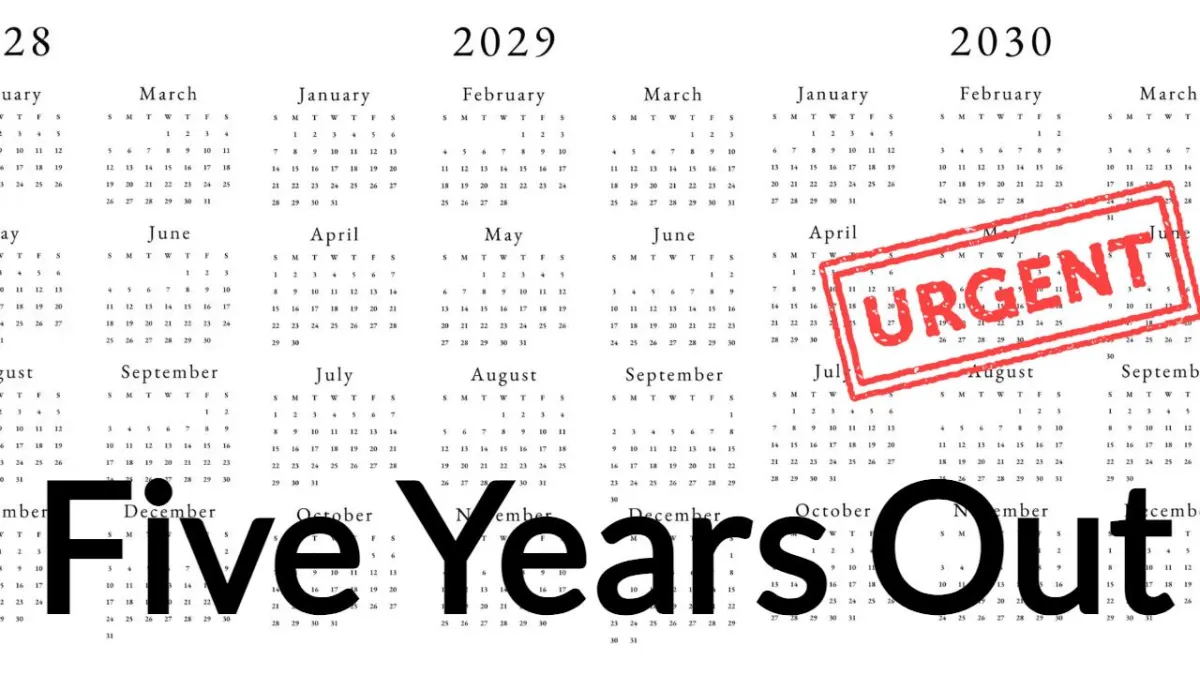
Five Years Out
The Mindset Mastery Memo is for ambitious professionals who want to lead with clarity, calm, and confidence. Each edition offers practical tools, mindset shifts, and real-world examples to help you navigate pressure, build stronger teams, and break free from patterns that no longer serve you—so you can lead with intention, not reaction.
Is it just me, or does 2020 feel like just yesterday?
And is it just me, or does time seem to be speeding up at an alarming pace?
Which means 2030, a date that feels more like science fiction than current events, is just around the corner.
At the urging of one of my mentors, Matt Church of Thought Leaders Business School, I've been spending a lot of time thinking about 2030, and what the world will be like, and how we can start preparing now for the evolutionary and revolutionary changes that are already upending The World As We Know It.
Organizations and think tanks have been publishing reports on The Future of Work and Skill Sets for the Future. Leaders are thinking hard about what kinds of work and what types of skills will be available for humans in the era of increasingly capable and unleashed AI.
The World Economic Forum surveyed thousands of employers around the globe about core skills that will be crucial to organizational success. Here are the top 12, in order of popularity:
Analytical thinking
Resilience, flexibility and agility
Leadership and social influence
Creative thinking
Motivation and self-awareness
Technological literacy
Empathy and active listening
Curiosity and lifelong learning
Talent management
Service orientation and customer service
AI and big data
Systems thinking
In other words, these are the competencies that are least likely to be made redundant by AI, and which will be sorely needed to steward humanity into a future of justice, wellbeing, and peace.
As I look at the list from the perspective of someone who supports leaders to have massive positive impact, one of them leaps out as the "Master Skill" that rules (or at least informs) them all. Can you guess which?
I think it's Talent Management writ large — that is, the ability to create systems for attracting, growing, and retaining talent across roles, life stages, and geographies.
This is a lot more than just developing or "fixing" individuals: "Hey, Sabrina, you need to become more creative."
It's a lot more than addressing short-term hiring gaps; it's about seeing 2030 from where you stand, and putting in place long-term systems to continually find, grow, keep, and unleash human potential. And orchestrating that potential to make a meaningful positive difference for employees, customers, stakeholders, and the world at large.
It's overwhelming, I know. You've got a dozen flaming emergencies on your plate right now, and the day's just started.
And who the hell can actually know what the world will be like in 5 years? Climate disruptions, technological disruptions, geopolitical instability — we have no relevant dataset or base rate upon which to make predictions.
And still...
If you don't think about it, the future is still barreling toward you (or you toward it, which is maybe a more empowering formulation).
You can't figure this out alone, and you don't have to.
Instead, here's an activity that invokes most of the other skills listed above, and is fun to boot:
Charge each member of your team with thinking about 2030, and their place in it.
What will your organization look like? What will it be doing? How big and complex will it have become?
What role does each person want to play in that scenario? What competencies will they have to master to succeed in that role? Do they want to?
What gaps do they see in the organization that need to be addressed?
Ask each team member to spend some time thinking about these questions. Have them share their responses with the team. Invite them to engage in the same exercise with their own teams.
You won't get full clarity, but you will have gotten the ball rolling.
And you'll have started a crucial conversation that will develop its own momentum, so you don't have to be the sole keeper of responsibility for the future.
If you'd like help getting yourself and your team ready for 2030 — through strategic planning, mentorship, coaching, or team facilitation — hit me up.
